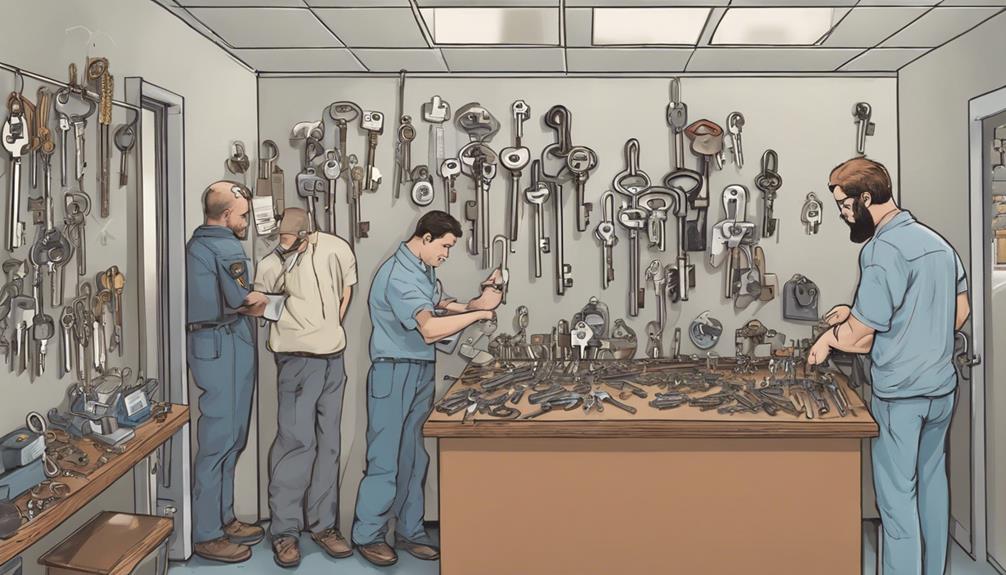Yes, a locksmith can definitely provide duplicate keys for your entire family or staff. This service allows each person to have access to specified areas, enhancing both convenience and security. It’s a cost-effective solution compared to replacing locks entirely. When choosing a locksmith, make sure they have the expertise and capability to handle the key systems you require. It’s also a great way to maintain security, as duplicating keys ensures that everyone has access without compromising the integrity of your property’s security systems. By looking deeper into the options available, you’ll find the best ways to manage your access needs effectively.
Understanding Key Duplication

Key duplication allows locksmiths to swiftly create exact copies of an original key, ensuring that every family member or staff member has convenient access to secured areas. Imagine you’re running a spy base—everyone needs access to the secret files, right? Well, locksmiths are your go-to for making sure that doesn’t turn into a game of “who’s got the key?” These wizards of the lock trade whip up duplicate keys faster than you can say “locked out.” Whether it’s for your home fortress or your office dungeon, having those extras can be a real lifesaver. Plus, it’s cost-effective and saves you from the hassle of redistributing keys whenever someone loses theirs—because, let’s face it, someone always does.
Residential Key Services

If you’re ever locked out of your home, emergency lockout services are a quick and reliable solution. Locksmiths can also rekey your locks, allowing you to have one key for multiple doors, which simplifies access for everyone in your household. These options enhance your home’s security and make managing keys much easier.
Home Rekeying Options
You can enhance your home’s security by rekeying all locks, which allows individual access control for each family member or staff. Imagine everyone having their own VIP pass to different parts of the castle! By changing the internal mechanics of the lock to fit a shiny new key, you render the old keys as useful as a chocolate teapot. It’s not only clever but also a budget-friendly alternative to replacing all your locks. This way, you decide who can sneak into the kitchen at midnight or access the home office. Plus, a skilled locksmith can zip through your home, setting everything up without turning your life upside down. So, ready to play gatekeeper?
Emergency Lockout Solutions
Locked out of your house? Our locksmiths offer swift emergency lockout solutions to get you back inside in no time. Ever wonder how a misplaced car key can lead to rediscovering your home keys under the couch cushions? Well, while we can’t solve the mystery of the wandering car key, we can certainly prevent a home lockout from turning into a camping trip on your porch. Our experts provide key duplication for your entire family, so everyone has access without playing hot potato with the last spare key. Say goodbye to the lockout blues and hello to a smoother, key-full existence. Don’t wait for the next full moon to realize you need duplicate keys!
Commercial Key Solutions

Locksmiths provide master keys that allow access to multiple doors within commercial properties, enhancing both security and convenience. You’re not just getting keys; you’re getting the “skeleton key” to your commercial kingdom! These wizards of locks also offer no-duplicate keys to keep your business’s secrets safer than a squirrel’s nut stash in winter.
| Key Type | Use Case | Security Level |
|---|---|---|
| Master Keys | Multiple Doors | High |
| No-Duplicate | Restricted Access | Very High |
| Electronic | Keyless Entry Systems | High |
| High-Security | Sensitive Areas | Maximum |
Automotive Key Duplication

While master keys enhance security for commercial settings, duplicating automotive keys offers similar benefits by ensuring family members or staff can access vehicles as needed. If you’ve ever been the victim of a misplaced car key, you know the panic that ensues—queue the dramatic music! But fret not, because you can call a professional locksmith to create duplicate keys for your vehicular fleet. They use fancy gadgets to perfectly match transponder keys and key fobs, so each copy works just like the original. And let’s be honest, who has the time or money to deal with a dealership? Save yourself the headache and likely a few bucks by having your locksmith on speed dial.
Security Enhancements

Have you considered how duplicate keys can greatly enhance the security of your property? Let’s delve into why handing out those extra keys isn’t just about sparing you the drama of locked-out relatives or late employees—it’s a masterstroke in security enhancements! By distributing duplicate keys, you guarantee that everyone has access only to the areas they need. It’s like giving a backstage pass, but only to the parts of the show they’re part of. Plus, locksmiths can whip up master keys faster than you can say ‘Open Sesame,’ making managing access as easy as pie. With these keys, you’re not just keeping doors locked; you’re strategically controlling the flow and safeguarding your space!
Choosing the Right Locksmith

When choosing a locksmith, it’s important to verify their professional credentials to make sure they’re qualified. You should also evaluate their experience level, especially in handling complex key systems for both residential and commercial settings. Lastly, confirm that they offer the scope of services you need, such as on-site duplication and master key creation.
Verify Professional Credentials
Explore thoroughly the credentials of your locksmith, including their license, certification, and insurance, to validate their professionalism and expertise. Before you reach out to them for a significant family or office key-making celebration, make sure to do your research. You wouldn’t want just anyone creating keys to your kingdom! Delve into online reviews and see what previous victims, I mean clients, have to say about their punctuality, craftsmanship, and whether they leave more smiles than frowns.
Also, take a glance at their membership in clubs like ALOA; it’s like the VIP lounge for locksmiths, ensuring quality and trust. And while you’re at it, don’t hesitate to ask for evidence of their wizardry. It’s better to be safe than sorry, right?
Assess Experience Level
You’ll want to choose a locksmith who has extensive experience in creating duplicate keys for both families and staff to guarantee a smooth process. When you’re juggling the key needs of a small army, whether it’s your hyperactive kids or caffeine-fueled office mates, it’s important. Make sure your locksmith isn’t just any Joe with a key machine but a certified sorcerer of the lock-and-key domain. Hunt down those rave reviews and glowing testimonials. When you find a mobile locksmith praised for their prowess, you’ve likely hit the jackpot. Remember, you’re not just copying keys; you’re ensuring every latecomer or forgetful Fred has hassle-free access, keeping your daily drama to a delightful minimum.
Confirm Service Scope
Make sure the locksmith you choose can handle the scope of services required, such as duplicating keys for both residential and commercial needs. When you need to call a locksmith, you don’t want to end up playing musical chairs with keys because they couldn’t manage the volume or variety you needed. So, confirm they’re up to speed with things like master key systems, which are as handy as a Swiss Army knife for managing who gets into what. It’s important to pick someone who won’t just nod and smile but actually deliver the goods. After all, you’re not trying to access the secrets of the universe—just making sure Aunt Mabel and your office manager don’t get locked out again!
Maintenance and Support

Guarantee your duplicate keys work smoothly by taking advantage of the maintenance and support services offered by professional locksmiths. Regular check-ups and timely fixes guarantee you’re never locked out due to a faulty key!
| Service Offered | Description | Key Advantage |
|---|---|---|
| Key Duplication | Creating copies for family or staff | Everyone gets access without delay |
| Maintenance Checks | Ensuring all keys function properly | Prevents lockouts and frustrations |
| Key Replacement | Quick swaps for lost or damaged keys | Continuous access is maintained |
| Access Management | Organizing who gets what key | Security and control in your hands |
Frequently Asked Questions
What Is the Average Cost for Duplicating Multiple Keys?
You’re looking at an average cost of $2 to $6 per key when you need multiple keys duplicated. Prices vary based on the key type and any special features. If you’re getting keys made for everyone at home or work, bulk discounts might be in the cards, so don’t forget to ask about those. Keep in mind, some locksmiths might have a minimum charge, regardless of how many keys you’re copying.
How Long Does Bulk Key Duplication Take?
Bulk key duplication typically takes a few hours to a day, depending on how many you need and what type you’re copying. Whether it’s simple house keys or more complex ones like transponder keys, the right equipment and technique are essential. To speed things up, plan ahead and chat with your locksmith about your needs. This way, you’ll guarantee everyone in your group gets their keys swiftly and smoothly.
Are There Discounts for Large Key Orders?
Sure, you’re wondering if there’s a price break when ordering keys in bulk. Well, you’re in luck! Many locksmiths do offer discounts when you need multiple keys. Whether it’s for your big family or your bustling staff, checking for specials can save you some cash. Just ask about bulk discounts, and you might snag a deal that keeps everyone’s keys jingling without emptying your wallet too much. Always worth a shot!
Can Keys Be Duplicated Without the Original?
Yes, you can get keys duplicated without the original. Locksmiths have advanced equipment and software to craft accurate duplicates just from the lock code or impression. However, they’ll usually ask for proof that you’re authorized to make copies to guarantee security isn’t compromised. So, if you’ve lost your keys but need more made, a skilled locksmith can definitely help you out, keeping things secure and straightforward.
Is Same-Day Service Available for Key Duplication?
Yes, same-day service for key duplication is often available. Imagine zipping through your busy day and still getting all your keys copied—locksmiths make it possible with their high-tech machines. They can swiftly produce copies for a variety of keys, whether for your home, office, or car. This service saves you time, ensuring you and your team or family have access without a hitch. Always check for availability!









